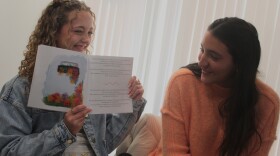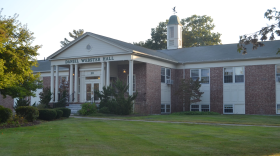This year is the 60th anniversary of the Freedom Flights from Cuba to the United States, which allowed thousands of refugees to flee Fidel Castro's Cuba safely by air rather than risk their lives trying to cross the ocean on a raft.
Moultonborough author Ana Hebra Flaster arrived in Nashua in 1967 as a refugee from Cuba on one of the Freedom Flights. This year the Trump administration indefinitely paused most refugee admissions to the country and also ended a program that allowed some Cubans to live in the US legally.
Puedes leer una versión de esta historia en espanol aquí.
In her new memoir, “Property of the Revolution: From a Cuban Barrio to a New Hampshire Mill Town,” Hebra Flaster describes how her family was able to make New Hampshire home after arriving here as refugees from Cuba.. At the time, they knew only a few Spanish-speaking people in Nashua. Today, nearly 5% of New Hampshire’s population are Hispanic.

She says it is hard to watch today as other refugees are refused legal entry to the country where she found sanctuary as a kid. She's concerned that people who are here under humanitarian parole could be persecuted for their religious and political beliefs if they are deported to their home countries.
“There's so much need and so much desperation in some of these places that have dictatorships and oppression and authoritarian regimes like Venezuela, Nicaragua and Cuba and Haiti,” Hebra Flaster said, referring to the countries involved in the humanitarian parole program.
“About a half a million people came from those countries in that three year period legally.”
She cited the case of two sisters who were arrested after protesting government oppression and living conditions in Cuba. Hebra Flaster says the sisters escaped to the US, and are now at risk of being deported back to Cuba.
“Should they be returned there, they will go to jail for expressing one of the basic human rights.”
Hebra Flaster will be discussing her memoir at the Moultonborough Public Library on Thursday, June 26th.
She spoke with NHPR Morning Edition producer Jackie Harris about her experience arriving in New Hampshire as a Cuban refugee in the 1960s, and how she’s seen the state change since.

Transcript
You live in Moultonborough now. Tell us more about why you and your family left Cuba and came to New Hampshire.
The revolution turned out to be another dictatorship, which is the opposite of what the rebels had promised. And life changed completely for my parents, who were working class and believed that the democracy would be restored. They decided at some point after about four or five years that they had to get out and they had to get us out.
And it was very difficult because you had to declare yourself an enemy of the revolution in order to get your exit papers, which was also something new that came with the revolution. Three years later, the guard arrived with the exit papers. We were kicked out of the house. Forty-eight hours later, we were in a Miami refugee center.
And then a Cuban family from our barrio had been sponsored by a Baptist church and had arrived just a few years before we had. They came and they told my father and mother, "We have a better place for you. We're up there, and there's lots of room for the kids to play. And the schools are good, the people are nice, and there are lots of factory jobs. There's a ton of snow, but we'll show you how to get through that."
And the landlord, his name was Ray Flanders – this was in Nashua, 1967 – he was a foreman at Hampshire Manufacturing. And there's nothing better than a factory job for an immigrant because you don't need to speak English, for the most part. And he offered to employ all of the adults who wanted to work. And he said, "Don't worry about the first month's rent. Pay me when you get your first checks." That was a home run.

In your book, you write that you were the only Latino family in the area. Nashua is a much more diverse place now. Has your childhood neighborhood changed?
My sister's a teacher in Nashua. My brother was a police officer in Nashua, and I know that there are many, many more Spanish speakers than there were when we were young. And I hear it when I go into stores, I hear Spanish. I mean, I'm tuned in to Spanish. But when we would hear Spanish, the adults and the family would go running to find out who the Spanish speaker was, where they were from, and would they be their friend? That's not a rare instance now.
You came to the U.S. as a refugee. The Trump administration has indefinitely paused most refugee admissions to the country and also ended a humanitarian program that allowed some Cubans to live in the US legally. What has this time been like for you and your family, knowing that the process that you got to be here isn't available to a lot of other families now?

Immigration is the luck of the draw, depending on what the political climate is. You can be extended the warm welcome that we were [given]. That was during the Cold War; we were on the right side of the Cold War.
But it's hard to watch what's happening now because there's so much need and so much desperation in some of these places that have dictatorships and oppression and authoritarian regimes like Venezuela, Nicaragua and Cuba and Haiti. Those were the four countries that were involved in the humanitarian parole program. About a half a million people came from those countries in that three year period legally.
And that's the key, right? There was a problem at the border here for a long time, there was a lack of control of what was happening. And what this administration is doing is, I think, far too broad and un-nuanced. Those are human beings whose lives are literally at risk when they're returned. That's a moral obligation, I think, that's being overlooked.









